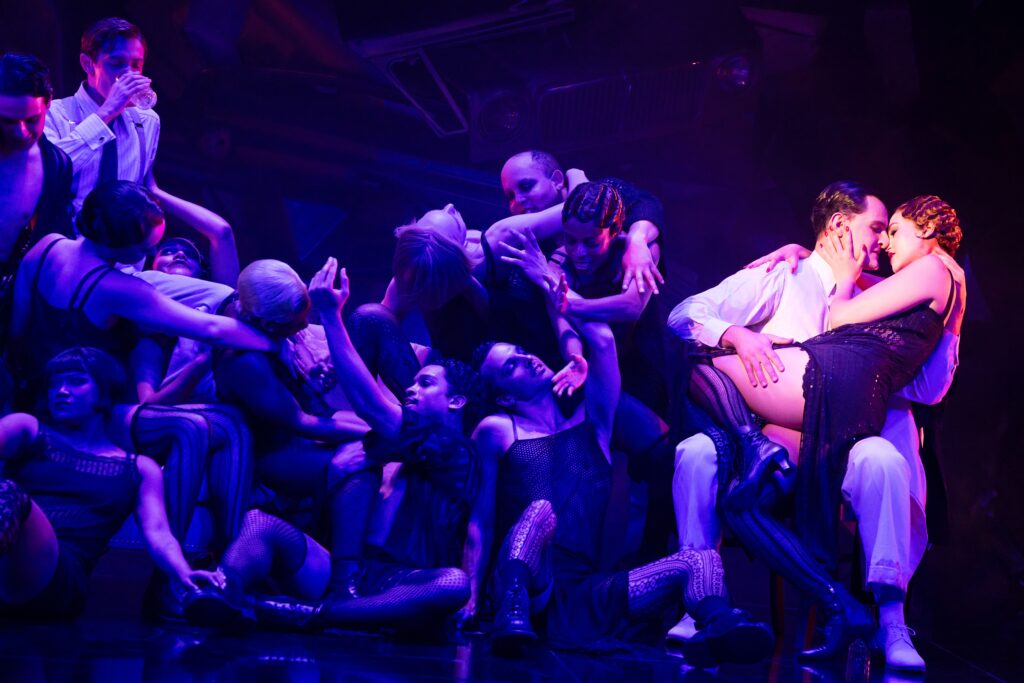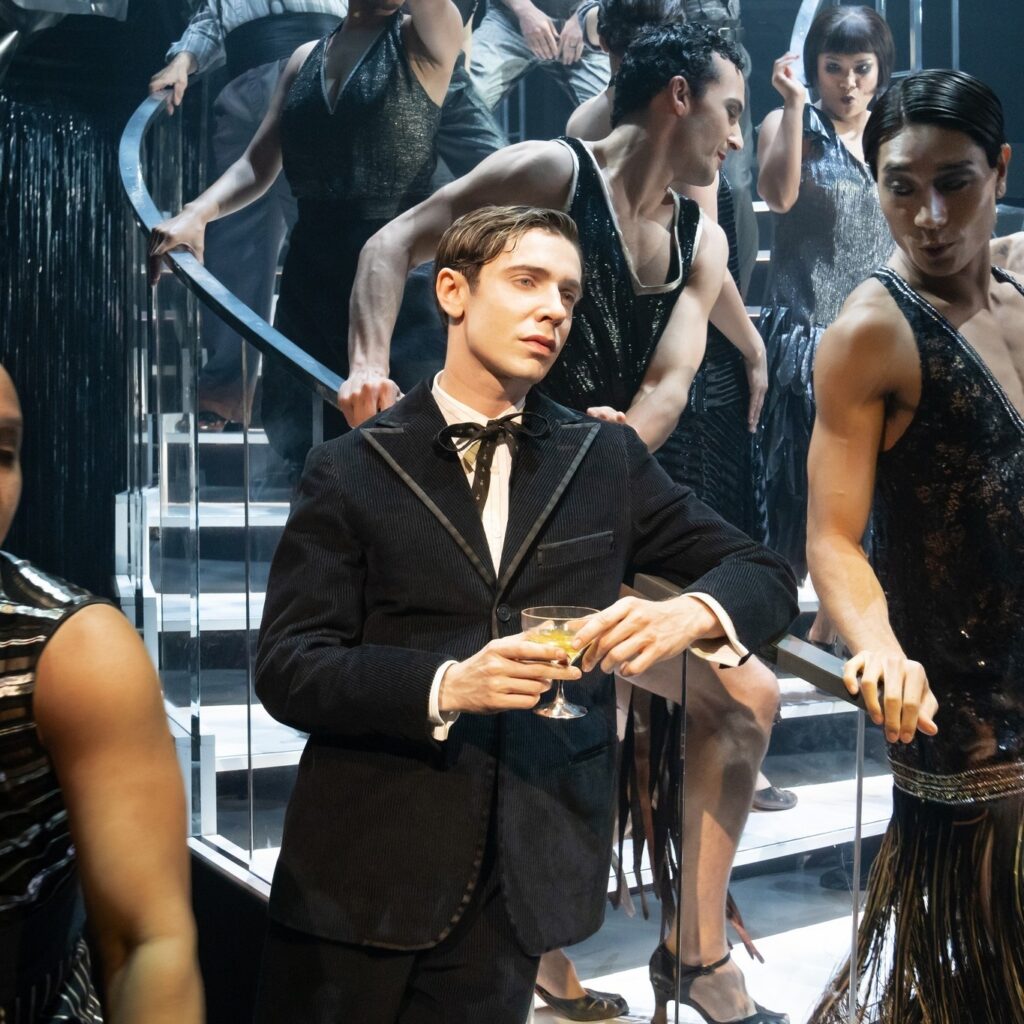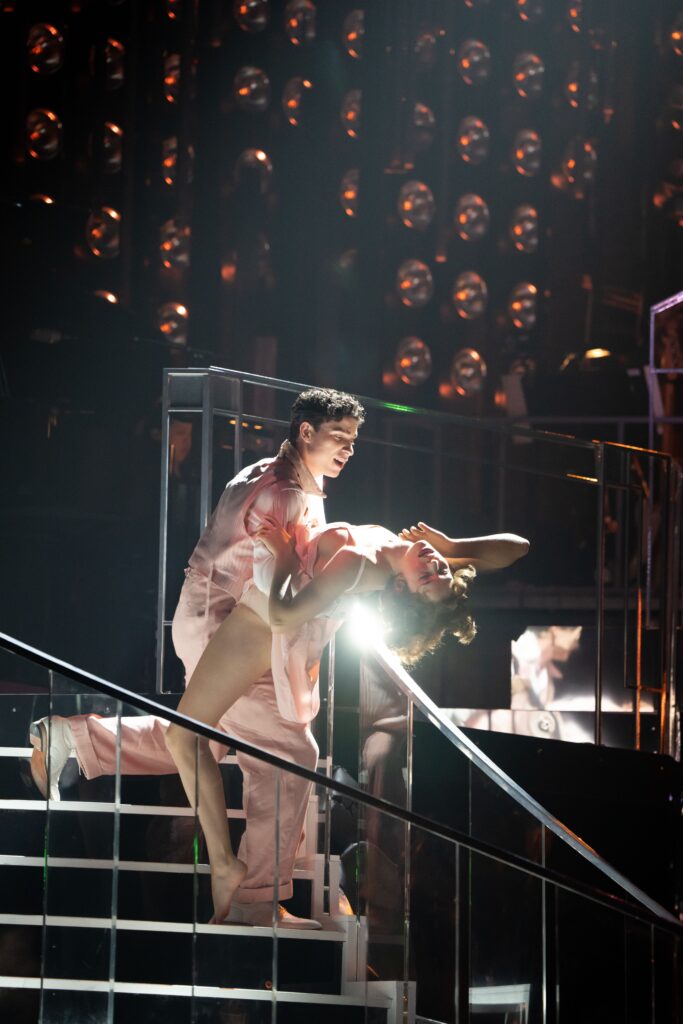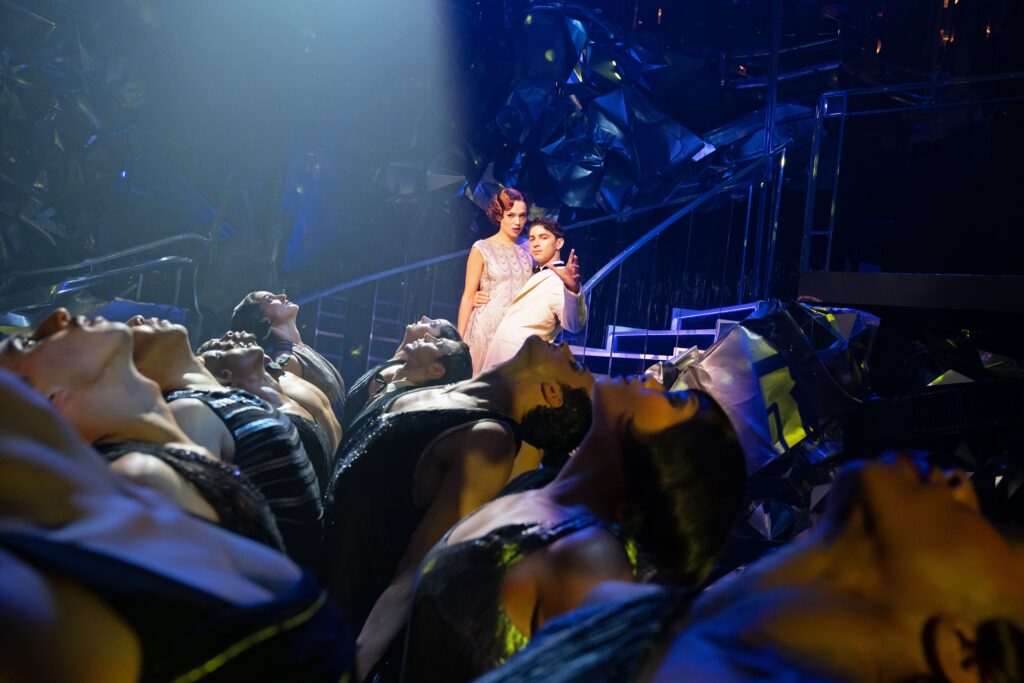
Photo Credits: Julieta Cervantes
“Gatsby.” Book by Martyna Majok based on the novel, “The Great Gatsby” by F. Scott Fitzgerald. Directed by Rachel Chavkin. Music by Florence Welch and Thomas Bartlett. Lyrics by Florence Welch. Choreography by Sonya Tayeh. Orchestration and Arrangements by Thomas Barlett. Scenic Design by Mimi Lien. Lighting Design by Alan C. Edwards. Presented by American Repertory Theater at the Loeb Drama Center, 64 Brattle St., Cambridge, through August 3.
By Shelley A. Sackett
“Gatsby” is a tour-de-force chockful of bells and whistles. A.R.T. spares nothing for its world premiere of the musical adaptation of Fitzgerald’s Jazz Age chronicle. Two colossal heaps of metallic sculpture reminiscent of the infernal “Hadestown” underworld are a Jenga/“Where’s Waldo” of identifiable automobile parts and crumpled rubble (set by Mimi Lien). Draped in gleaming tinsel and expertly lighted by Alan C. Edwards, these gloomy twin towers are a continual reminder of the dangers of decadence and the debris it leaves in its wake.
Like “Moby Dick” and other inventive re-tellings of familiar tales, it’s clear from the get-go that A.R.T. will once again raise the bar on production values.
In preparation for seeing “Gatsby,” I reread the novel both to refresh my 9th-grade memory and to better understand where (and guess why) Martyna Majok had chosen to be faithful to and stray from the original in her adaptation. While hardly necessary – the storyline is short on subtlety – it was fun when I recognized a line that had struck us both as particularly poignant.
At its heart, however, this “Gatsby” is a musical, and the tale is told through its 25 musical numbers. (Unfortunately, the 13-piece orchestra often drowns out those lyrics, leaving the frustrated audience to fill in the blanks). In the exciting first number, “Welcome to the New World,” we meet our narrator, Nick Carraway (Ben Levi Ross), who fills us in on time, place, and tenor. It’s 1922, and the influenza plague and World War I, although in the rearview mirror, left emotional, physical, and financial wreckage in its wake. As if awakening from a nightmare, Jazz Age America has emerged, revving its engine and ready to roar.

Underscoring the headiness of the era, the 15-member ensemble bursts on the stage clad in flapper period and contemporary non-cis costumes. Costume designer Sandy Powell cleverly introduces us to the main characters by dressing them symbolically. George and Myrtle, the have-not couple, are dressed in hellish red. Daisy, Tom and their friend Jordan, the silver-spoon gentry, wear heavenly white. And Jay Gatsby, our eponymous protagonist, appropriately wears an in-between pink.
As the plot unfolds, so do these characters’ backstories. Each harbors longings, secrets and disappointments that propel them towards disaster while attracting and repulsing them to and from each other. Majok exercises editorial discretion (and keen perception) in adding a richly nuanced focus on these relationships that are lacking in Fitzgerald’s novel.
Nick is just back from the war. While he presents as the affable, “aw shucks” mid-Westerner, his baggage includes heavy loads of PTSD and grief. He has sought the diversion of Long Island high society and the company of his cousin Daisy to reset the trajectory of his life. He rents a cottage for the summer and is immediately invited to join the Fellini-esque world of ultra-rich navel-gazers.
Daisy (Charlotte MacInnes), a former Louisville belle, is married to scion Tom Buchanan (Cory Jeacoma) and lives in a fairytale mansion with her loutish, philandering husband. She and Gatsby had met and fallen in love years ago, right before he was shipped off to war. Her childhood friend and famous golf pro, Jordan Baker (Eleri Ward), provides the stability and affection so sorely lacking in her marriage. She is also the play’s flapper Pied Piper, flamboyantly hedonistic and desperate for everyone to follow her reckless lead.

Tom is as spoiled and obnoxious as they come. He wears his entitlement as a badge of honor, helping himself to whatever suits his fleeting fancy, including Myrtle Wilson (Solea Pfeiffer), the blue-collar wife of a gas station owner who yearns for the sparkling trinkets Tom dangles before her. Her voracious appetite for excess and risk are sated in the short run, but the long-term damage is one of the play’s underlying themes.
George Wilson (Matthew Amira), Myrtle’s husband, is outnumbered and outmaneuvered. Honest, hard-working, decent, and loyal, he doesn’t stand a chance.
This brings us to Jay Gatsby (Isaac Powell), the mysterious epicenter of the action who throws parties reminiscent of the Rocky Horror Picture Show. Personifying a corrupted version of the “American Dream” where wealth is the sole solution to all of life’s challenges, his obsession with Daisy and maniacally detailed plan to win her back are the ill-fated coattails onto which every other character’s fate hangs.
To her great credit, playwright Majok has managed to both plumb the intricacies of these individuals and their various romantic liaisons and dalliances and create a rip-roaringly entertaining almost-three-hour evening of outstanding song and dance.
Under Rachel Chavkin’s talented direction, the cast hits that sweet spot between virtuoso solo and ensemble performances. There are ample opportunities for each to shine in words, song, and dance. MacInnis brings a needed self-awareness to Daisy, who could easily become a cardboard character. She is as disconsolate a victim in “I’ve Changed My Mind” as she is scheming perpetrator in the duet with Tom in “The Damage That You Do.” Both feature her amazing voice.
As Jordan, Ward adds a sophisticated cynicism and “been there, done that” breeziness to the unbridled frenzy that surrounds the other characters. Willowy and lithe, she is a pleasure to watch as she glides around the cabaret party settings.
Jeacoma (Tom), Powell (Gatsby), and Amira (Wilson) stay in character in less shaded roles. Ross brings a slightly tinted palette to Nick, making him more mysterious and less pathetic than he at times seemed in the novel.
It is Pfeiffer as Myrtle and Adam Grupper as Meyer Wolfsheim, Gatsby’s mentor and syndicate boss, who really stand out. In addition to her outstanding voice, Pfeiffer easily transitions between the grief, rage, and despair she feels in her trapped marriage to a gas jockey and the giddiness of being wildly out of control in the sybaritic world to which Tom gives her the key. I only wish the orchestra didn’t drown out half of her songs.

Grupper, a Sydney Greenstreet of a presence, could not be drowned out by a 20-piece brass band (thank goodness). “Feels Like Hell,” his solo, brings down the house.
Lien’s flexible set is a presence of its own. Spanning the entire proscenium, the wide staircase, balcony, and stage allow three small scenes to play simultaneously, adding interest and challenge. And last but hardly least, Welch’s music and lyrics turn Fitzgerald’s 200-page novel into an operatic dramatic feast. While there are no tunes that stick in your head after the curtain falls, the actors’ universally extraordinary voices and Welch’s spot-on lyrics (when we can hear them) are the backbone of this summer extravaganza.For more information and to buy tickets, visit: https://americanrepertorytheater.org/

